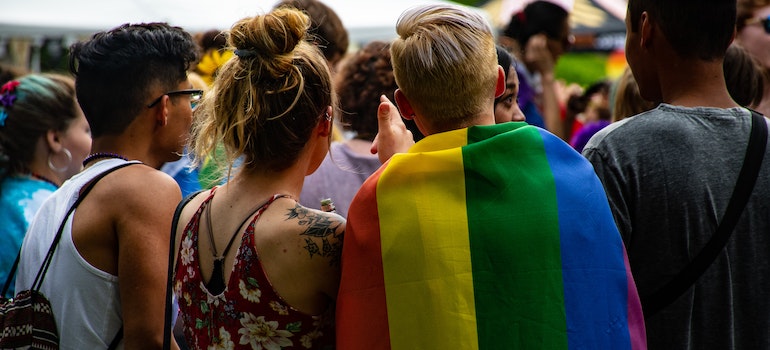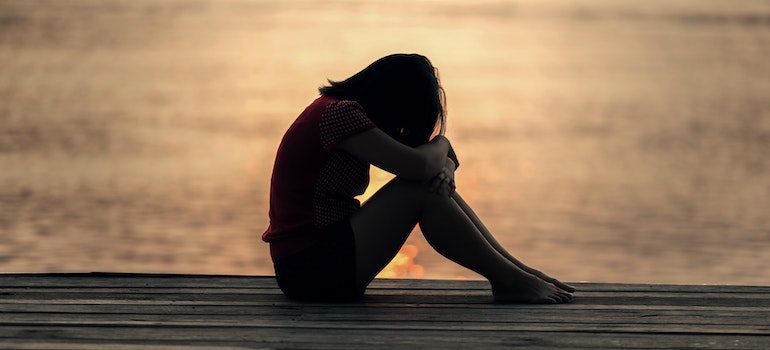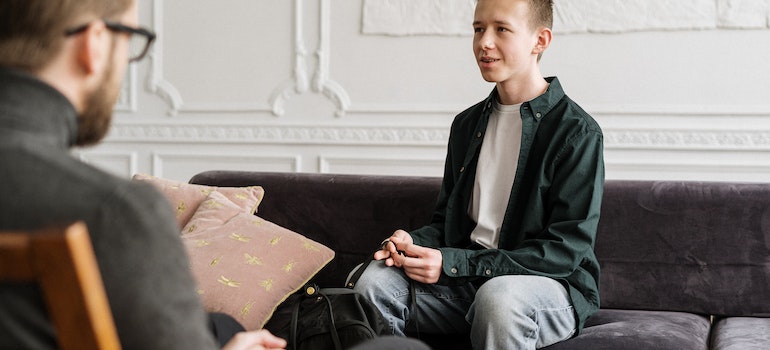Mental health and addiction issues are common concerns for people from all walks of life. However, for members of the LGBTQ+ community, these issues can be particularly challenging to navigate. Despite the progress made in recent years towards greater acceptance and visibility for LGBTQ+ folks, discrimination and societal pressures still exist, leading to a greater risk of mental health issues and substance use disorders. In this article, we will explore the unique mental health and addiction issues in the LGBTQ+ community. We at Harmony Ridge Recovery Center WV believe that through compassion and understanding, we can work together to improve outcomes for this vulnerable population.
Understanding the problem paves a path to solving it
The LGBTQ+ community has unique challenges when it comes to understanding mental health and addiction. Stigma and prejudice persist, making it challenging for people to get appropriate treatment and assistance, despite recent advances in acceptance and understanding. Thus, the LGBTQ+ community still faces persistent problems with mental health and substance abuse.

The prevalence of mental health issues and addictions is higher in the LGBTQ+ community
Compared to their straight peers, those who identify as part of the LGBTQ+ community have a greater chance of having mental health concerns and drug use disorders, according to studies. Two times as many people in the LGBTQ+ community as in the general population suffer from depression and anxiety, according to data from the Substance Abuse and Mental Health Services Administration.
Moreover, the rates of tobacco and alcohol use are much higher. This further increases the likelihood that they will develop substance use disorders. People who are struggling tend to choose cognitive behavioral therapy for substance use disorders as a way to deal with all of these problems at once.
Many factors contribute to the problems
Many people in the LGBTQ+ community struggle with mental health and substance abuse for a variety of reasons. Individual and social considerations are equally at play here. Social problems such as discrimination, stigma, and inadequate care provision all play a role. Bullying, harassment, and violence against people based on their sexual orientation or gender identity may also be traumatic experiences.
Fear is the greatest enemy
Coming out might also exacerbate preexisting mental health conditions and exacerbate substance abuse problems. Fear of rejection and prejudice may raise stress and anxiety throughout the coming out process. As a result, according to the experience of our experts at the rehab center near Cambridge OH, some people may seek solace in alcohol or drugs to deal with their intense feelings.

Common mental health issues in the LGBTQ+ community
Depression, anxiety disorders, post-traumatic stress disorder (PTSD), and suicidal thoughts are all too common in the LGBTQ+ population. These are only some of the reasons why the existence of dual diagnosis treatment in West Virginia is essential. Although the LGBTQ+ community is not alone in experiencing mental health problems, its members face unique challenges that put them at greater risk.
Discrimination, rejection, and an overall lack of acceptance from friends and family may all exacerbate mental health problems. Depression and anxiety may both be triggered or made worse by emotions of loneliness, despair, and poor self-esteem.
PTSD
Those in the LGBTQ+ community who have experienced trauma because of their sexual orientation or gender identity are particularly vulnerable to developing post-traumatic stress disorder (PTSD). This may take the form of physical or verbal aggression. It may be difficult for people to feel safe and secure after experiencing such trauma and worry. That’s why individual therapy for addiction is crucial for rehabilitation – a lot of underlying problems can’t be discovered without an individual approach.
Suicide
Suicidal ideation is another major problem in the LGBTQ+ community. Many patients at an inpatient drug rehab in WV suffered from suicidal thoughts prior to developing an addiction. It’s important to note that there are higher rates of suicidal thoughts and suicide attempts by members of the LGBTQ+ community compared to the general population.
While there is no single cause for suicidal thoughts in the LGBTQ+ community, factors such as discrimination, stigma, and a lack of resources can all play a role. Likewise, those who aren’t accepted by their loved ones and the larger community may begin to feel forlorn and despair, which may lead to suicidal thoughts.

The role of environment
It’s crucial to recognize that mental health problems in the LGBTQ+ community are exacerbated by structural and institutional discrimination and stigma. As a result of these two, many people avoid reaching out for aid and support for fear of being judged or punished. Mental health problems are made worse by social isolation and hopelessness. This may result from a lack of access to adequate treatment and support.
It is critical to offer culturally competent treatment and assistance in welcoming, safe environments for the LGBTQ+ population to address mental health challenges. This includes making available mental health experts with expertise in helping people who identify as members of the LGBTQ+ community deal with their specific experiences and issues.
It’s also crucial to strive toward eliminating prejudice and stigma and to equip loved ones and the community with information and support. But, the probably most important part is the existence of good family therapy for addiction in WV because most of these kinds of ‘environmental’ problems come from the closest environment.

Strong barriers keeping us from the goal
Accessing mental health and addiction treatment can be a significant challenge for individuals in the LGBTQ+ community. There are several barriers that can make it difficult for individuals to access the care and support they need, including:
- stigma and discrimination
- lack of culturally competent providers
- financial barriers
- lack of insurance coverage
Stigma and harassment in the world without proper education
Stigma and prejudice in healthcare settings may create considerable barriers for individuals in the LGBTQ+ community who seek mental health and addiction treatment. Unfortunately, we live in a world where stigma lies even in the corners where it mustn’t. Healthcare providers may discriminate, harass, or abuse many people who identify as LGBTQ+. This may be especially challenging for those who have experienced sexual or gender identity-related trauma. As a result, they will not feel secure or supported enough to discuss their experiences with providers.
Lack of culturally competent providers
A lack of culturally competent clinicians may also prevent LGBTQ+ people from receiving mental health and addiction treatment. Many physicians are unprepared to address the specific needs of the LGBTQ+ community, resulting in inadequate or inappropriate treatment. Those dealing with sexual orientation or gender identity issues may have an even harder time accessing specialized treatment that is not widely available.
Financial barriers
Financial barriers and lack of insurance coverage can make it difficult for individuals in the LGBTQ+ community to access mental health and addiction treatment. Many individuals in the LGBTQ+ community face economic challenges, which can limit their ability to afford the cost of treatment. The cost of treatment can be especially high for individuals who require specialized care related to their sexual or gender identity.
Moreover, many insurance policies do not cover mental health and addiction treatment or may provide inadequate coverage. This can make it difficult for individuals to access the care they need, even if they are able to afford it. Insurance policies may also have high deductibles, co-payments, or out-of-pocket maximums that can create significant financial burdens for individuals seeking mental health and addiction treatment.

Lack of insurance coverage
The lack of insurance coverage for mental health and addiction treatment can be particularly challenging for individuals in the LGBTQ+ community. As we mentioned before, studies have shown that LGBTQ+ individuals are more likely to experience mental health and addiction issues, making it essential that they have access to the care and support they need. Without adequate insurance coverage, many individuals may not be able to afford the cost of treatment, which can exacerbate their mental health and addiction issues and lead to further isolation and despair.
Increased funding and specific policies
Addressing financial barriers and lack of insurance coverage requires policy-level changes that ensure that mental health and addiction treatment is accessible and affordable for all individuals, regardless of their sexual or gender identity. This can be achieved through increased funding for mental health and addiction treatment. Additionally, through policies that mandate insurance coverage for these services.
Some organizations and initiatives have been established to help individuals in the LGBTQ+ community access affordable mental health and addiction treatment. These include non-profit organizations, sliding-scale clinics, and community health centers. They provide low-cost or free mental health and addiction services. Some states also offer Medicaid or other state-sponsored insurance programs that cover cocaine addiction rehab in WV and other types of treatment.
The best practices in addressing mental health and addiction issues in LGBTQ+ communities
Addressing mental health and addiction issues in the LGBTQ+ community requires a comprehensive and multifaceted approach. It’s important to:
- create safe and inclusive spaces
- provide culturally competent care
- address intersectional identities and experiences
- collaborate with LGBTQ+ organizations and community leaders
Creating safe and inclusive spaces for LGBTQ+ individuals
It’s important to create safe and inclusive spaces for LGBTQ+ individuals to access mental health and addiction treatment. This includes creating environments where individuals feel comfortable discussing their sexual or gender identity without fear of discrimination or harassment. Group therapy for addiction plays a major role here. Providers should work to create safe spaces. They can achieve this by using inclusive language, displaying symbols of support such as rainbow flags or safe zone stickers, and being knowledgeable about LGBTQ+ issues.

Providing culturally competent care
It’s important for healthcare providers to be trained in providing culturally competent care to individuals in the LGBTQ+ community. This includes understanding the unique experiences and challenges faced by LGBTQ+ individuals. Additionally, being knowledgeable about the various ways in which these issues can impact mental health and addiction is a must. Providers should also be familiar with the latest research on LGBTQ+ mental health and addiction issues.
Addressing intersectional identities and experiences
Many individuals in the LGBTQ+ community have intersectional identities and experiences that can impact their mental health and addiction. This includes experiences related to race, ethnicity, religion, disability, and socio-economic status. Providers should be aware of these intersectional identities and experiences. They should be able to provide care that takes them into account. Knowing the principles in dialectical behavior therapy for addiction can be of huge help.
Collaborating with LGBTQ+ organizations and community leaders
Collaborating with LGBTQ+ organizations and community leaders can be an effective way to address mental health and addiction issues in the LGBTQ+ community. These organizations and leaders can help provide resources, education, and support to healthcare providers and individuals in the community. According to the experience of our experts at a rehab center near Athens OH, this collaboration can help build trust and strengthen relationships between healthcare providers and the LGBTQ+ community.

Steps we already made and steps to be made
Luckily, the rays of the sun seem to make the world’s greatest rainbow stronger every day. In our line of work, there have been many successful programs and interventions designed to address mental health and addiction issues in the LGBTQ+ community. Some of the brightest examples are:
- The Fenway Institute
- The Los Angeles LGBT Center
- The Pride Study
- The Trevor Project
The Fenway Institute
The Fenway Institute is a non-profit organization that provides healthcare services to the LGBTQ+ community. The Institute has developed several successful programs to address mental health and addiction issues in the LGBTQ+ community. For example, the Institute’s Behavioral Health department provides culturally competent care for individuals in the LGBTQ+ community. The Institute’s Recovery Services program also offers support and resources to individuals recovering from addiction.
The Los Angeles LGBT Center
The Los Angeles LGBT Center is the largest provider of healthcare services to the LGBTQ+ community in the world. The Center has developed several successful programs and interventions to address mental health and addiction issues in the community. For example, the Center’s Addiction Recovery Services program provides comprehensive treatment to individuals struggling with addiction. The Center’s Mental Health Services program also offers a range of services. This includes counseling and therapy for individuals struggling with mental health issues.

The Pride Study
The Pride Study is a research project focused on studying the health and well-being of LGBTQ+ individuals. The study aims to collect data on mental health and addiction issues in the LGBTQ+ community and develop interventions to address these issues. The Pride Study has already made significant contributions to our understanding of mental health and addiction issues in the LGBTQ+ community.
The Trevor Project
The Trevor Project is a non-profit organization focused on providing crisis intervention and suicide prevention services to LGBTQ+ youth. The organization was founded in 1998 by James Lecesne, Peggy Rajski, and Randy Stone in memory of Trevor, a 13-year-old boy who died by suicide because he felt he had nowhere to turn for help.
The Trevor Project operates the Trevor Lifeline, a 24/7 crisis intervention and suicide prevention helpline that provides free and confidential support to LGBTQ+ youth. The helpline is staffed by trained volunteers who are sensitive to the unique needs and experiences of LGBTQ+ individuals.
The helpline is available through chat and text as well
In addition to the Trevor Lifeline, the organization also operates TrevorChat and TrevorText, which provide crisis support through online chat and text messaging. The organization also offers educational resources and training for individuals and organizations on topics related to LGBTQ+ mental health and suicide prevention.

The Trevor Project has been instrumental in raising awareness about the mental health challenges faced by LGBTQ+ youth. It’s also a major tool for providing support and resources to those in need. The organization has helped countless individuals access the care and support they need to live healthy and fulfilling lives.
The LGBT Community Center’s Addiction Recovery Services
The LGBT Community Center’s Addiction Recovery Services (ARS) is a program that provides comprehensive addiction treatment services to individuals in the LGBTQ+ community. The program is designed to address the unique needs and experiences of LGBTQ+ individuals struggling with addiction. It’s also supposed to help them achieve lasting recovery.
At our drug rehab center near Huntington WV, experts provide a serene and supportive environment for individuals in recovery. The center offers a range of evidence-based treatment modalities. This includes individual and group therapy, cognitive behavioral therapy, and trauma-informed care.
Having trained professionals and a holistic approach is key
The ARS program is staffed by a team of highly trained and compassionate professionals. They are dedicated to supporting individuals in their journey to recovery. The team includes licensed therapists, addiction counselors, and medical professionals. They are all knowledgeable about the specific needs and experiences of LGBTQ+ individuals.
The ARS program relies on holistic therapy for addiction a lot, addressing not only the physical aspects of addiction but also the underlying emotional and psychological issues that may contribute to addictive behavior. The program is designed to provide individuals with the tools and resources they need to build a solid foundation for lasting recovery.

A safe and supportive environment is imperative
One of the unique aspects of the ARS program is its focus on creating a safe and supportive environment for LGBTQ+ individuals in recovery. Many individuals in the LGBTQ+ community may have experienced discrimination, harassment, or trauma related to their sexual or gender identity, which can make it challenging to seek addiction treatment. The ARS program is designed to create a safe and inclusive space where individuals can feel comfortable discussing their experiences and receive the support and resources they need to achieve lasting recovery.
In addition to providing addiction treatment services, the ARS program also offers a range of support services to help individuals navigate the challenges of recovery. These services include case management, life skills training, art therapy rehabilitation, and peer support groups. The program is designed to provide individuals with the support they need to achieve their goals and live fulfilling lives in recovery.
Breaking barriers that hold back the whole community
Overall, the LGBT Community Center’s Addiction Recovery Services is a program that is making a significant impact in the lives of individuals in the LGBTQ+ community struggling with addiction. The program is designed to address the unique needs and experiences of LGBTQ+ individuals. Also, it provides them with the support and resources they need to achieve lasting recovery. By creating a safe and supportive environment for LGBTQ+ individuals in recovery, the ARS program is helping to break down barriers and improve access to addiction treatment services for this underserved population.
Addressing mental health and addiction issues in the LGBTQ+ community is our duty
Mental health and addiction issues in the LGBTQ+ community remain a deep problem. Due to the deep and underlying cultural and historical background of these two, we have yet to put a lot of effort into making the lives of people in the LGBTQ+ community better. Every single one of us needs to shine the rays of the sun to make the rainbow shine bright and harmonious under the wide blue sky we all belong under.



